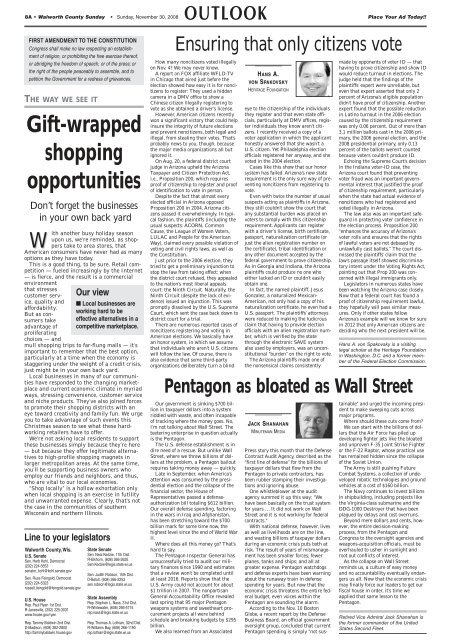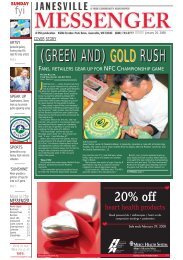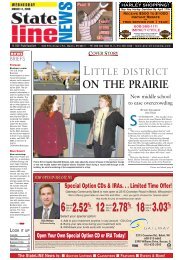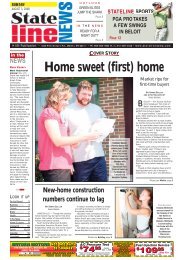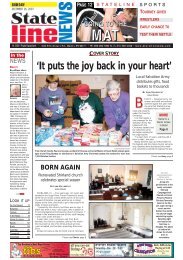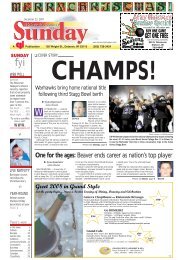lb - Community Shoppers, Inc.
lb - Community Shoppers, Inc.
lb - Community Shoppers, Inc.
Create successful ePaper yourself
Turn your PDF publications into a flip-book with our unique Google optimized e-Paper software.
OUTLOOK<br />
8A Walworth County Sunday Sunday, November 30, 2008 Place Your Ad Today!!<br />
FIRST AMENDMENT TO THE CONSTITUTION<br />
Congress shall make no law respecting an establishment<br />
of religion, or prohibiting the free exercise thereof,<br />
or abridging the freedom of speech, or of the press; or<br />
the right of the people peaceably to assemble, and to<br />
petition the Government for a redress of grievances.<br />
THE WAY WE SEE IT<br />
Gift-wrapped<br />
shopping<br />
opportunities<br />
Don’t forget the businesses<br />
in your own back yard<br />
W ith<br />
another busy holiday season<br />
upon us, we’re reminded, as shoppers<br />
take to area stores, that<br />
American consumers have never had as many<br />
options as they have today.<br />
This is a good thing, to be sure. Retail competition<br />
— fueled increasingly by the Internet<br />
— is fierce, and the result is a commercial<br />
environment<br />
that stresses<br />
customer service,<br />
quality and<br />
affordability.<br />
But as consumers<br />
take<br />
advantage of<br />
proliferating<br />
choices — and<br />
Walworth County, Wis.<br />
U.S. Senate<br />
Sen. Herb Kohl, Democrat<br />
(202) 224-5653<br />
senator_kohl@kohl.senate.gov<br />
Sen. Russ Feingold, Democrat<br />
(202) 224-5323<br />
russell_feingold@feingold.senate.gov<br />
U.S. House<br />
Rep. Paul Ryan 1st Dist.<br />
R-Janesville, (202) 225-3031<br />
www.house.gov/ryan<br />
Rep. Tammy Baldwin 2nd Dist.<br />
D-Madison, (608) 362-2800<br />
http://tammybaldwin.house.gov<br />
Our view<br />
■ Local businesses are<br />
working hard to be<br />
effective alternatives in a<br />
competitive marketplace.<br />
mull shopping trips to far-flung malls — it’s<br />
important to remember that the best option,<br />
particularly at a time when the economy is<br />
staggering under the weight of a credit crisis,<br />
just might be in your own back yard.<br />
Local businesses in many of our communities<br />
have responded to the changing marketplace<br />
and current economic climate in myriad<br />
ways, stressing convenience, customer service<br />
and niche products. They’ve also joined forces<br />
to promote their shopping districts with an<br />
eye toward creativity and family fun. We urge<br />
you to take advantage of such events this<br />
Christmas season to see what these hardworking<br />
retailers have to offer.<br />
We’re not asking local residents to support<br />
these businesses simply because they’re here<br />
— but because they offer legitimate alternatives<br />
to high-profile shopping magnets in<br />
larger metropolitan areas. At the same time,<br />
you’ll be supporting business owners who<br />
employ our friends and neighbors, and thus,<br />
who are vital to our local economies.<br />
“Shop locally” is a hollow exhortation only<br />
when local shopping is an exercise in futility<br />
and unwarranted expense. Clearly, that’s not<br />
the case in the communities of southern<br />
Wisconsin and northern Illinois.<br />
Line to your legislators<br />
State Senate<br />
Sen. Neal Kedzie, 11th Dist.<br />
R-Elkhorn, (608) 266-2635<br />
Sen.Kedzie@legis.state.wi.us<br />
Sen. Judith Robson, 15th Dist.<br />
D-Beloit, (608) 266-2253<br />
sen.robson@legis.state.wi.us<br />
State Assembly<br />
Rep. Stephen L. Nass, 31st Dist.<br />
R-Whitewater, (608) 266-5715<br />
rep.nass@legis.state.wi.us<br />
Rep. Thomas A. Lothian, 32nd Dist.<br />
R-Williams Bay, (608) 266-1190<br />
rep.lothian@legis.state.wi.us<br />
Ensuring that only citizens vote<br />
How many noncitizens voted illegally<br />
on Nov. 4? We may never know.<br />
A report on FOX affiliate WFLD-TV<br />
in Chicago that aired just before the<br />
election showed how easy it is for noncitizens<br />
to register: They used a hidden<br />
camera in a DMV office to show a<br />
Chinese citizen illegally registering to<br />
vote as she obtained a driver’s license.<br />
However, American citizens recently<br />
won a significant victory that could help<br />
insure the integrity of future elections<br />
and prevent noncitizens, both legal and<br />
illegal, from stealing their votes. That’s<br />
probably news to you, though, because<br />
the major media organizations all but<br />
ignored it.<br />
On Aug. 20, a federal district court<br />
judge in Arizona upheld the Arizona<br />
Taxpayer and Citizen Protection Act,<br />
i.e., Proposition 200, which requires<br />
proof of citizenship to register and proof<br />
of identification to vote in person.<br />
Despite the fact that almost every<br />
elected official in Arizona opposed<br />
Proposition 200 in 2004, Arizona citizens<br />
passed it overwhelmingly. In typical<br />
fashion, the plaintiffs (including the<br />
usual suspects: ACORN, Common<br />
Cause, the League of Women Voters,<br />
LULAC and People for the American<br />
Way), claimed every possible violation of<br />
voting and civil rights laws, as well as<br />
the Constitution.<br />
Just prior to the 2006 election, they<br />
tried to get a preliminary injunction to<br />
stop the law from taking effect; when<br />
the district court refused, they appealed<br />
to the nation’s most liberal appeals<br />
court: the Ninth Circuit. Naturally, the<br />
Ninth Circuit (despite the lack of evidence)<br />
issued an injunction. This was<br />
promptly dissolved by the U.S. Supreme<br />
Court, which sent the case back down to<br />
district court for a trial.<br />
There are numerous reported cases of<br />
noncitizens registering and voting in<br />
American elections. We basically have<br />
an honor system, in which we assume<br />
that individuals who aren’t U.S. citizens<br />
will follow the law. Of course, there is<br />
also evidence that some third-party<br />
organizations deliberately turn a blind<br />
Pentagon as bloated as Wall Street<br />
Our government is sinking $700 billion<br />
in taxpayer dollars into a system<br />
riddled with waste, and often incapable<br />
of tracking where the money goes. No,<br />
I’m not talking about Wall Street. The<br />
teetering enterprise in question actually<br />
is the Pentagon.<br />
The U.S. defense establishment is in<br />
dire need of a rescue. But unlike Wall<br />
Street, where we threw billions of dollars<br />
at the problem, a Pentagon bailout<br />
requires taking money away — quickly.<br />
Late in September, when America’s<br />
attention was consumed by the presidential<br />
election and the collapse of the<br />
financial sector, the House of<br />
Representatives passed a defenseauthorization<br />
bill totaling $612 billion.<br />
Our overall defense spending, factoring<br />
in the wars in Iraq and Afghanistan,<br />
has been stretching toward the $700<br />
billion mark for some time now, the<br />
highest level since the end of World War<br />
II.<br />
Where does all this money go? That’s<br />
hard to say.<br />
The Pentagon Inspector General has<br />
unsuccessfully tried to audit our military<br />
finances since 1990 and estimates<br />
that a review won’t be completed until<br />
at least 2016. Reports show that the<br />
U.S. Army could not account for about<br />
$1 trillion in 2007. The nonpartisan<br />
General Accountability Office revealed<br />
last spring that 95 major Pentagon<br />
weapons systems and sweetheart procurement<br />
projects all were behind<br />
schedule and breaking budgets by $295<br />
billion.<br />
We also learned from an Associated<br />
HANS ANS A.<br />
VON SPAKOVSKY PAKOVSKY<br />
HERITAGE FOUNDATION<br />
eye to the citizenship of the individuals<br />
they register and that even state officials,<br />
particularly at DMV offices, register<br />
individuals they know aren’t citizens.<br />
I recently received a copy of a<br />
voter application in which the applicant<br />
honestly answered that she wasn’t a<br />
U.S. citizen. Yet Philadelphia election<br />
officials registered her anyway, and she<br />
voted in the 2004 election.<br />
Cases like this show that our honor<br />
system has failed. Arizona’s new state<br />
requirement is the only sure way of preventing<br />
noncitizens from registering to<br />
vote.<br />
Even with twice the number of usual<br />
suspects acting as plaintiffs in Arizona,<br />
they still couldn’t show the court that<br />
any substantial burden was placed on<br />
voters to comply with this citizenship<br />
requirement. Applicants can register<br />
with a driver’s license, birth certificate,<br />
passport, naturalization certificate (or<br />
just the alien registration number on<br />
the certificate), tribal identification or<br />
any other document accepted by the<br />
federal government to prove citizenship.<br />
As in Georgia and Indiana, the Arizona<br />
plaintiffs could produce no one who<br />
either lacked an ID or couldn’t easily<br />
obtain one.<br />
In fact, the named plaintiff, Jesus<br />
Gonzalez, a naturalized Mexican-<br />
American, not only had a copy of his<br />
naturalization certificate, he even had a<br />
U.S. passport. The plaintiffs’ attorneys<br />
were reduced to making the ludicrous<br />
claim that having to provide election<br />
officials with an alien registration number,<br />
which is verified by the state<br />
through the electronic SAVE system<br />
also used by employers, was an unconstitutional<br />
“burden” on the right to vote.<br />
The Arizona plaintiffs made one of<br />
the nonsensical claims consistently<br />
JACK ACK SHANAHAN HANAHAN<br />
MINUTEMAN MEDIA<br />
Press story this month that the Defense<br />
Contract Audit Agency, described as the<br />
“first line of defense” for the billions of<br />
taxpayer dollars that flow from the<br />
Pentagon to private contractors, has<br />
been rubber stamping their investigations<br />
and ignoring abuse.<br />
One whistleblower at the audit<br />
agency summed it up this way: “We<br />
have been basically on the trust system<br />
for years … It did not work on Wall<br />
Street and it is not working for federal<br />
contracts.”<br />
With national defense, however, lives<br />
as well as livelihoods are on the line,<br />
and wasting billions of taxpayer dollars<br />
during an economic crisis puts both at<br />
risk. The result of years of mismanagement<br />
has been smaller forces; fewer<br />
planes, tanks and ships; and all at<br />
greater expense. Pentagon watchdogs<br />
and defense experts have been warning<br />
about the runaway train in defense<br />
spending for years. But now that the<br />
economic crisis threatens the entire federal<br />
budget, even voices within the<br />
Pentagon are sounding the alarm.<br />
According to the Nov. 10 Boston<br />
Globe, a recent report by the Defense<br />
Business Board, an official government<br />
oversight group, concluded that current<br />
Pentagon spending is simply “not sus-<br />
made by opponents of voter ID — that<br />
having to prove citizenship and show ID<br />
would reduce turnout in elections. The<br />
judge held that the findings of the<br />
plaintiffs’ expert were unreliable, but<br />
even that expert asserted that only 2<br />
percent of Arizona’s eligible population<br />
didn’t have proof of citizenship. Another<br />
expert found that the possible reduction<br />
in Latino turnout in the 2006 election<br />
caused by the citizenship requirement<br />
was only 0.06 percent. Out of more than<br />
3.1 million ballots cast in the 2006 primary,<br />
the 2006 general election, and the<br />
2008 presidential primary, only 0.13<br />
percent of the ballots weren’t counted<br />
because voters couldn’t produce ID.<br />
Echoing the Supreme Court’s decision<br />
in the Indiana voter-ID case, the<br />
Arizona court found that preventing<br />
voter fraud was an important governmental<br />
interest that justified the proof<br />
of citizenship requirement, particularly<br />
when the state had actual evidence of<br />
noncitizens who had registered and<br />
voted illegally in Arizona.<br />
The law also was an important safeguard<br />
in protecting voter confidence in<br />
the election process. Proposition 200<br />
“enhances the accuracy of Arizona’s<br />
voter rolls and ensures that the rights<br />
of lawful voters are not debased by<br />
unlawfully cast ballots.” The court dismissed<br />
the plaintiffs’ claim that the<br />
law’s passage itself showed discriminatory<br />
intent under the Voting Rights Act,<br />
pointing out that Prop 200 was concerned<br />
with illegal immigrants only.<br />
Legislators in numerous states have<br />
been watching the Arizona case closely.<br />
Now that a federal court has found a<br />
proof of citizenship requirement lawful,<br />
they hopefully will pass similar measures.<br />
Only if other states follow<br />
Arizona’s example will we know for sure<br />
in 2012 that only American citizens are<br />
deciding who the next president will be.<br />
Hans A. von Spakovsky is a visiting<br />
legal scholar at the Heritage Foundation<br />
in Washington, D.C. and a former member<br />
of the Federal Election Commission.<br />
tainable” and urged the incoming president<br />
to make sweeping cuts across<br />
major programs.<br />
Where should these cuts come from?<br />
We can start with the billions of dollars<br />
that the Air Force has piled up<br />
developing fighter jets like the bloated<br />
and unproven F-35 Joint Strike Fighter<br />
or the F-22 Raptor, whose practical use<br />
has remained hidden since the collapse<br />
of the Soviet Union.<br />
The Army is still pushing Future<br />
Combat Systems, a collection of undeveloped<br />
robotic technologies and ground<br />
vehicles at a cost of $160 billion.<br />
The Navy continues to invest billions<br />
in shipbuilding, including projects like<br />
the Virginia-class submarine and the<br />
DDG-1000 Destroyer that have been<br />
plagued by delays and cost overruns.<br />
Beyond mere dollars and cents, however,<br />
the entire decision-making<br />
process, from the Pentagon and<br />
Congress to the oversight agencies and<br />
weapons-acquisition officials, must be<br />
overhauled to usher in sunlight and<br />
root out conflicts of interest.<br />
As the collapse on Wall Street<br />
reminds us, a culture of easy money<br />
and no accountability eventually endangers<br />
us all. Now that the economic crisis<br />
may finally force our leaders to get our<br />
fiscal house in order, it’s time we<br />
applied that same lesson to the<br />
Pentagon.<br />
Retired Vice Admiral Jack Shanahan is<br />
the former commander of the United<br />
States Second Fleet.


